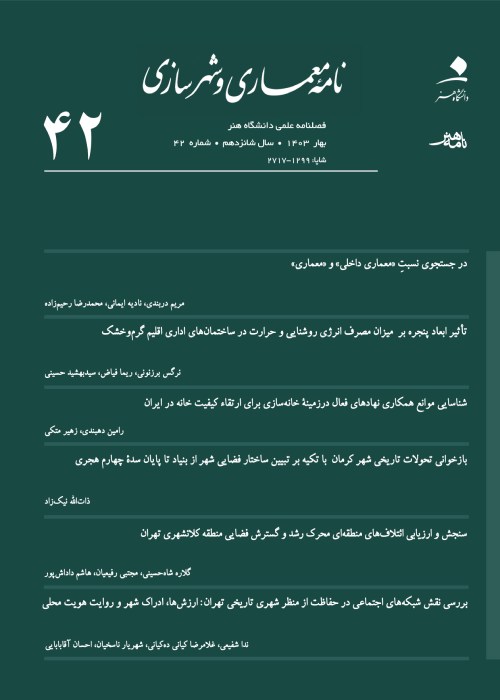Analysis of Impacts of Social Capitals on Participation to Improve Urban Deteriorated Areas
Case Study: Imamzadeh Hassan Neighborhood, 17th District, Tehran
Author(s):
Abstract:
The physical comprehensive viewpoint on development has been the reason of failure of many urban plans in practice. One major reason can be lack of consideration and attention to existing capacities and potentials within communities. In this regard, dilapidated areas are usually considered to have many problems and weaknesses, while they can include capacities that considering them might lead to acceleration of their development. Social capital as an important part of local capacity can be used by individuals and groups to facilitate their accessibility to local resources and would bring the possibility of taking better decisions for their welfare in addition to giving democratic validity to a community. The key concepts in social capital include participation in social networks, existence of common norms and creation of social trust. Social capital provides the possibility of achieving specific objectives which are inaccessible without it. This issue is critically important in improving dilapidated areas, since the residents would find themselves shareholders in the implementation of the project benefiting from its added value, which can result in improvement of their life quality. The objective of this paper is to investigate the rate and method of effectiveness of social capital indicators on participation tendency of local residents. In order to reach this goal, the indicators are extracted from domestic and international studies and are measured in Imamzadeh Hassan neighborhood located in 17th District of Tehran through survey and random sampling. The results of correlation analysis of social capital indicators and the tendency for participation in neighborhood indicate that indicators of belongingness (0.332), social participation (0.412), inter-personal trust (0.401), institutional trust (0.352) and social integration (0.335) are effective on participation tendency of residents; however the indicator of safety has no impact on it. Moreover, the results for path analysis of participation tendency and effective indicators of social capital indicate that the indicator of institutional trust (0.21) has a direct and increasing impact on participation tendency and indicators of interpersonal trust (0.077), local belongingness (0.042) and social integration (0.018) had indirect increasing impact on participation tendency and the indicator of social participation has both direct (0.176) and indirect (0.041) increasing impact on participation tendency. These results indicate that developing effective social capitals on participation, especially social participation and institutional trust as the most important factors, can be considered as a way to promote quality of urban dilapidated areas. Along this, organizing the local management system and providing the possibility of growth for NGOs is considered to be an inevitable issue. Furthermore, the productive foundations of social capital, which are creating new identities based on citizen participation, shall be recognized and they shall be used in favor of urban management.
Language:
Persian
Published:
Journal of Architecture and Urban Planning, Volume:7 Issue: 14, 2015
Page:
25
magiran.com/p1392879
دانلود و مطالعه متن این مقاله با یکی از روشهای زیر امکان پذیر است:
اشتراک شخصی
با عضویت و پرداخت آنلاین حق اشتراک یکساله به مبلغ 1,390,000ريال میتوانید 70 عنوان مطلب دانلود کنید!
اشتراک سازمانی
به کتابخانه دانشگاه یا محل کار خود پیشنهاد کنید تا اشتراک سازمانی این پایگاه را برای دسترسی نامحدود همه کاربران به متن مطالب تهیه نمایند!
توجه!
- حق عضویت دریافتی صرف حمایت از نشریات عضو و نگهداری، تکمیل و توسعه مگیران میشود.
- پرداخت حق اشتراک و دانلود مقالات اجازه بازنشر آن در سایر رسانههای چاپی و دیجیتال را به کاربر نمیدهد.
In order to view content subscription is required
Personal subscription
Subscribe magiran.com for 70 € euros via PayPal and download 70 articles during a year.
Organization subscription
Please contact us to subscribe your university or library for unlimited access!


